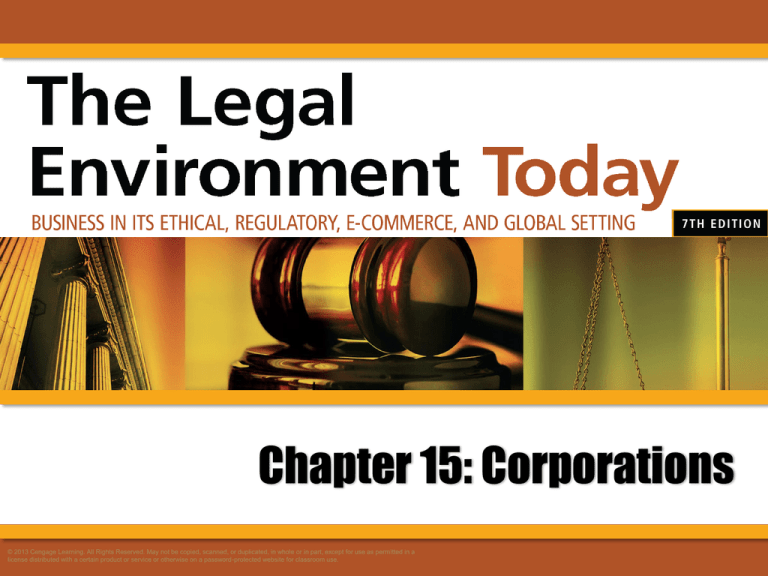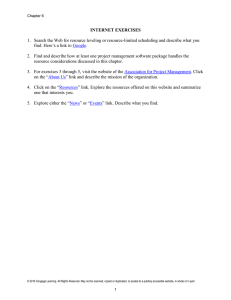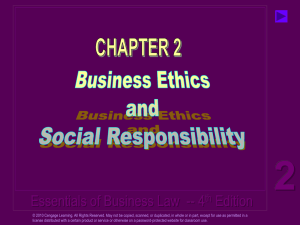
Chapter 15: Corporations
© 2013 Cengage Learning. All Rights Reserved. May not be copied, scanned, or duplicated, in whole or in part, except for use as permitted in a
© 2013 distributed
Cengage Learning.
All Rights
Reserved.
May
be copied,
or duplicated,
in whole
or in part, except
license
with a certain
product
or service
or not
otherwise
on a scanned,
password-protected
website
for classroom
use. for use as permitted in a
license distributed with a certain product or service or otherwise on a password-protected website for classroom use.
Corporate Nature and Classification
A corporation is a creature of statute,
an artificial “person.”
• Corporations can have one or more
shareholders.
• Owners can be natural persons or
other businesses.
• Corporation substitutes itself for
shareholders.
© 2013 Cengage Learning. All Rights Reserved. May not be copied, scanned, or duplicated, in whole or in part, except for use as permitted in a
license distributed with a certain product or service or otherwise on a password-protected website for classroom use.
2
Corporate Nature and Classification
Corporations are recognized as legal
“persons” and enjoy virtually same
rights and privileges under our
Constitution as natural persons.
© 2013 Cengage Learning. All Rights Reserved. May not be copied, scanned, or duplicated, in whole or in part, except for use as permitted in a
license distributed with a certain product or service or otherwise on a password-protected website for classroom use.
3
Corporate Nature and Classification
Corporate Personnel.
• Responsibility for overall management
of company rests with board of
directors (elected by shareholders).
• Board of directors makes policy
decisions and hires officers to run
corporation on a daily basis.
© 2013 Cengage Learning. All Rights Reserved. May not be copied, scanned, or duplicated, in whole or in part, except for use as permitted in a
license distributed with a certain product or service or otherwise on a password-protected website for classroom use.
4
Corporate Nature and Classification
Corporate Personnel.
• Shareholders can sue corporation and
be sued by corporation and bring suit
for corporation in some instances.
© 2013 Cengage Learning. All Rights Reserved. May not be copied, scanned, or duplicated, in whole or in part, except for use as permitted in a
license distributed with a certain product or service or otherwise on a password-protected website for classroom use.
5
Corporate Nature and Classification
Limited Liability of Shareholders.
• One of the key advantages of
corporations is the limited liability of
shareholders
• In certain situations, the corporate
“veil” of limited liability can be pierced,
holding the shareholders personally
liable.
© 2013 Cengage Learning. All Rights Reserved. May not be copied, scanned, or duplicated, in whole or in part, except for use as permitted in a
license distributed with a certain product or service or otherwise on a password-protected website for classroom use.
6
Corporate Nature and Classification
Corporate Earnings and Taxation.
• Corporate profits can either be kept as
retained earnings or passed on to the
shareholders as dividends.
• Corporate Taxation: corporate taxes
can be taxes twice, first to the
corporation, then to the shareholders
via dividends.
© 2013 Cengage Learning. All Rights Reserved. May not be copied, scanned, or duplicated, in whole or in part, except for use as permitted in a
license distributed with a certain product or service or otherwise on a password-protected website for classroom use.
7
Corporate Nature and Classification
Torts and Criminal Acts.
• Corporation is liable for the torts
committed by its agents or officers
within the course and scope of their
employment under the doctrine of
respondeat superior.
© 2013 Cengage Learning. All Rights Reserved. May not be copied, scanned, or duplicated, in whole or in part, except for use as permitted in a
license distributed with a certain product or service or otherwise on a password-protected website for classroom use.
8
Corporate Nature and Classification
Torts and Criminal Acts.
• Corporation can be liable for criminal
acts, but only fined.
• Responsible officers may go to prison.
© 2013 Cengage Learning. All Rights Reserved. May not be copied, scanned, or duplicated, in whole or in part, except for use as permitted in a
license distributed with a certain product or service or otherwise on a password-protected website for classroom use.
9
Corporate Nature and Classification
Classification of Corporations.
• Domestic corporation does business in
its state of incorporation.
• Foreign corporation from X state doing
business in Z state.
• Alien Corporation: formed in another
country doing business in United
States.
© 2013 Cengage Learning. All Rights Reserved. May not be copied, scanned, or duplicated, in whole or in part, except for use as permitted in a
license distributed with a certain product or service or otherwise on a password-protected website for classroom use.
10
Corporate Nature and Classification
Classification of Corporations.
• Public and Private Corporations.
• Nonprofit Corporations.
© 2013 Cengage Learning. All Rights Reserved. May not be copied, scanned, or duplicated, in whole or in part, except for use as permitted in a
license distributed with a certain product or service or otherwise on a password-protected website for classroom use.
11
Corporate Nature and Classification
Classification of Corporations.
• Closely Held Corporations.
• Management of Closely Held Corporations.
• Transfer of Shares
• Shareholder Agreement to Restrict Stock.
• Misappropriation of Closely Held
Corporation Funds.
• CASE 15.1 RUBIN V. MURRAY (2011). How
would you determine reasonable
compensation?
© 2013 Cengage Learning. All Rights Reserved. May not be copied, scanned, or duplicated, in whole or in part, except for use as permitted in a
license distributed with a certain product or service or otherwise on a password-protected website for classroom use.
12
Corporate Nature and Classification
Classification of Corporations.
• “S” Corporations: avoids federal tax
under IRS Code “Subchapter S.”
• Avoids federal “double taxation” of regular
corporations at the corporate level. Only
dividends are taxed to the shareholders as
personal income.
© 2013 Cengage Learning. All Rights Reserved. May not be copied, scanned, or duplicated, in whole or in part, except for use as permitted in a
license distributed with a certain product or service or otherwise on a password-protected website for classroom use.
13
Corporate Nature and Classification
Classification of Corporations.
• “S” Corporations: avoids federal tax
under IRS Code “Subchapter S.”
• IRS requirements: Corporation is
domestic, fewer than 100 shareholders,
only one class of stock, no shareholder
can be a non-resident alien.
• Professional Corporations.
© 2013 Cengage Learning. All Rights Reserved. May not be copied, scanned, or duplicated, in whole or in part, except for use as permitted in a
license distributed with a certain product or service or otherwise on a password-protected website for classroom use.
14
Corporate Formation and Powers
The process of incorporation
generally involves two steps:
• Preliminary and Promotional Activities;
and
• The Legal Process of Incorporation.
© 2013 Cengage Learning. All Rights Reserved. May not be copied, scanned, or duplicated, in whole or in part, except for use as permitted in a
license distributed with a certain product or service or otherwise on a password-protected website for classroom use.
15
Corporate Formation and Powers
Promotional Activities.
• Before corporation is formed,
promoters are the persons who take
the preliminary steps of organizing the
venture and attracting investors via
subscription agreements.
© 2013 Cengage Learning. All Rights Reserved. May not be copied, scanned, or duplicated, in whole or in part, except for use as permitted in a
license distributed with a certain product or service or otherwise on a password-protected website for classroom use.
16
Corporate Formation and Powers
Promotional Activities.
• Promoter’s Liability: Promoter is
personally liable for pre-incorporation
contracts on behalf of the corporation,
unless 3rd party agrees to hold future
corporation liable.
© 2013 Cengage Learning. All Rights Reserved. May not be copied, scanned, or duplicated, in whole or in part, except for use as permitted in a
license distributed with a certain product or service or otherwise on a password-protected website for classroom use.
17
Corporate Formation and Powers
Incorporation Procedures.
Promotion
File Articles of
Incorporation
Name
Search
State
Charter
© 2013 Cengage Learning. All Rights Reserved. May not be copied, scanned, or duplicated, in whole or in part, except for use as permitted in a
license distributed with a certain product or service or otherwise on a password-protected website for classroom use.
Subscribers
1st Organizational Meeting
18
Corporate Formation and Powers
Incorporation Procedures.
• Select State of Incorporation.
• Secure the Corporate Name.
• Must include words that disclose corporate
status.
• Cannot infringe on another’s trademark
name.
© 2013 Cengage Learning. All Rights Reserved. May not be copied, scanned, or duplicated, in whole or in part, except for use as permitted in a
license distributed with a certain product or service or otherwise on a password-protected website for classroom use.
19
Corporate Formation and Powers
Incorporation Procedures.
• Prepare the Articles of Incorporation:
which deals with shares, the registered agent
and office, incorporators, duration and
purpose, and internal organization.
• File the articles with the state.
© 2013 Cengage Learning. All Rights Reserved. May not be copied, scanned, or duplicated, in whole or in part, except for use as permitted in a
license distributed with a certain product or service or otherwise on a password-protected website for classroom use.
20
Corporate Formation and Powers
First Organizational Meeting.
• Adopt Bylaws:
• After the corporation is “chartered”
(created) it can do business.
• At meeting, shareholders should approve
the bylaws, elect directors, hire officers
and ratify pre-incorporation contracts and
activities.
© 2013 Cengage Learning. All Rights Reserved. May not be copied, scanned, or duplicated, in whole or in part, except for use as permitted in a
license distributed with a certain product or service or otherwise on a password-protected website for classroom use.
21
Corporate Formation and Powers
Improper Incorporation.
• De Jure: substantial statutory requirements
are met; cannot be attacked by state or 3rd
parties.
• De Facto: statutory requirements not met,
but promoters made good faith effort to
comply with corporate law; can only be
attacked by state.
© 2013 Cengage Learning. All Rights Reserved. May not be copied, scanned, or duplicated, in whole or in part, except for use as permitted in a
license distributed with a certain product or service or otherwise on a password-protected website for classroom use.
22
Corporate Formation and Powers
Improper Incorporation.
• Corporation by Estoppel: If it acts like a
corporation, it cannot avoid liability by
claiming that no corporation exists.
© 2013 Cengage Learning. All Rights Reserved. May not be copied, scanned, or duplicated, in whole or in part, except for use as permitted in a
license distributed with a certain product or service or otherwise on a password-protected website for classroom use.
23
Corporate Formation and Powers
Corporate Powers.
• Express Powers.
• Found in the corporation’s articles of
incorporation, the laws of the state of
incorporation, and in the state and federal
corporations.
• Corporate by-laws may also grant or limit a
corporation’s express powers.
© 2013 Cengage Learning. All Rights Reserved. May not be copied, scanned, or duplicated, in whole or in part, except for use as permitted in a
license distributed with a certain product or service or otherwise on a password-protected website for classroom use.
24
Corporate Formation and Powers
Corporate Powers.
• Implied Powers.
• To perform all acts reasonably necessary to
accomplish its corporate purposes.
• A corporate officer can bind corporation in
contract in matters connected with the
ordinary business affairs of the enterprise.
© 2013 Cengage Learning. All Rights Reserved. May not be copied, scanned, or duplicated, in whole or in part, except for use as permitted in a
license distributed with a certain product or service or otherwise on a password-protected website for classroom use.
25
Corporate Formation and Powers
Corporate Powers.
• Ultra Vires Doctrine.
• Corporate acts beyond the express or
implied powers of the corporation (by
statute of articles of incorporation).
• Corporate articles of incorporations now
adopt very broad purposes to prevent
lawsuits against the corporation.
© 2013 Cengage Learning. All Rights Reserved. May not be copied, scanned, or duplicated, in whole or in part, except for use as permitted in a
license distributed with a certain product or service or otherwise on a password-protected website for classroom use.
26
Piercing the Corporate Veil
In certain situations, courts will
“pierce the corporate veil” and hold
shareholders personally liable in the
interests of justice and fairness.
© 2013 Cengage Learning. All Rights Reserved. May not be copied, scanned, or duplicated, in whole or in part, except for use as permitted in a
license distributed with a certain product or service or otherwise on a password-protected website for classroom use.
27
Piercing the Corporate Veil
Factors That Lead Courts to Pierce.
• A party is tricked into dealing with a
corporation rather than the individual.
• Corporation is set up never to make a
profit or remain insolvent or is under
capitalized.
© 2013 Cengage Learning. All Rights Reserved. May not be copied, scanned, or duplicated, in whole or in part, except for use as permitted in a
license distributed with a certain product or service or otherwise on a password-protected website for classroom use.
28
Piercing the Corporate Veil
Factors That Lead Courts to Pierce.
• Corporation is formed to evade an
existing legal obligation.
• Statutory formalities are not followed.
• Commingling of personal and
corporate interests or assets.
© 2013 Cengage Learning. All Rights Reserved. May not be copied, scanned, or duplicated, in whole or in part, except for use as permitted in a
license distributed with a certain product or service or otherwise on a password-protected website for classroom use.
29
Piercing the Corporate Veil
A Potential Problem for Closely Held
Corporations.
• CASE 15.2 SCHULTZ V. GENERAL ELECTRIC
HEALTHCARE FINANCIAL SERVICES (2010).
Why was Schultz personally liable?
© 2013 Cengage Learning. All Rights Reserved. May not be copied, scanned, or duplicated, in whole or in part, except for use as permitted in a
license distributed with a certain product or service or otherwise on a password-protected website for classroom use.
30
Directors and Officers
Directors:
• Individual directors are not agents of
corporation. Only the board itself can
act as a “super-agent” and bind the
corporation.
• A director can also be a shareholder,
especially in closely-held corporations.
© 2013 Cengage Learning. All Rights Reserved. May not be copied, scanned, or duplicated, in whole or in part, except for use as permitted in a
license distributed with a certain product or service or otherwise on a password-protected website for classroom use.
31
Directors and Officers
Directors.
• Election of Directors.
• Generally, the number of directors is set forth
in the articles of incorporation:
• Directors appointed at the first organizational
meeting. In closely held companies, directors
are generally the incorporators and/or the
shareholders.
• Term of office is generally for one year.
© 2013 Cengage Learning. All Rights Reserved. May not be copied, scanned, or duplicated, in whole or in part, except for use as permitted in a
license distributed with a certain product or service or otherwise on a password-protected website for classroom use.
32
Directors and Officers
Directors.
• Election of Directors.
• Removal of Directors: directors can be
removed for cause.
• Vacancies on Board: if director dies or
resigns or new position created by the
articles or bylaws.
© 2013 Cengage Learning. All Rights Reserved. May not be copied, scanned, or duplicated, in whole or in part, except for use as permitted in a
license distributed with a certain product or service or otherwise on a password-protected website for classroom use.
33
Directors and Officers
Directors.
• Compensation of Directors.
• Inside director (officer), vs. outside director.
Often the same person is both an officer and
director, and receives compensation as an
officer.
• Board of Directors’ Meetings.
• Quorum must be present to conduct official
business.
© 2013 Cengage Learning. All Rights Reserved. May not be copied, scanned, or duplicated, in whole or in part, except for use as permitted in a
license distributed with a certain product or service or otherwise on a password-protected website for classroom use.
34
Directors and Officers
Directors.
• Committees of the Board.
• Executive Committee.
• Audit Committee.
• Nominating Committee.
• Compensation Committee.
• Litigation Committee.
© 2013 Cengage Learning. All Rights Reserved. May not be copied, scanned, or duplicated, in whole or in part, except for use as permitted in a
license distributed with a certain product or service or otherwise on a password-protected website for classroom use.
35
Directors and Officers
Directors.
• Rights of Directors.
• Participate in corporate decisions and
inspect corporate books and records.
• Compensation (usually a nominal sum).
Corporation should guarantee
reimbursement or purchase liability
insurance to protect the board from personal
liability.
© 2013 Cengage Learning. All Rights Reserved. May not be copied, scanned, or duplicated, in whole or in part, except for use as permitted in a
license distributed with a certain product or service or otherwise on a password-protected website for classroom use.
36
Directors and Officers
Corporate Officers and Executives.
• Officers serve at the pleasure of the Board
of Directors but have fiduciary duties to
company.
• Their employment relationships are
generally governed by contract law and
employment law.
• Officers may be terminated for cause.
© 2013 Cengage Learning. All Rights Reserved. May not be copied, scanned, or duplicated, in whole or in part, except for use as permitted in a
license distributed with a certain product or service or otherwise on a password-protected website for classroom use.
37
Directors and Officers
Duties and Liabilities of Directors and
Officers.
• Directors and officers are fiduciaries and
owe the company ethical and legal duties.
• Duty of Care.
• Duty to Make Informed Decisions. Directors are
expected to be fully informed on corporate
matters.
© 2013 Cengage Learning. All Rights Reserved. May not be copied, scanned, or duplicated, in whole or in part, except for use as permitted in a
license distributed with a certain product or service or otherwise on a password-protected website for classroom use.
38
Directors and Officers
Duties and Liabilities of Directors and
Officers.
• Duty of Care (cont’d).
• Duty to Exercise Reasonable Supervision.
Directors are expected to supervise officers
when delegated work.
• Dissenting Directors: rarely held individually
liable to the corporation.
© 2013 Cengage Learning. All Rights Reserved. May not be copied, scanned, or duplicated, in whole or in part, except for use as permitted in a
license distributed with a certain product or service or otherwise on a password-protected website for classroom use.
39
Directors and Officers
Duties and Liabilities of Directors and
Officers.
• Business Judgment Rule: immunizes a director
or officer from liability from bad decisions.
• Court will not require directors or officers to
manage “in hindsight.” BJR will apply as long
as decision was reasonable, informed, made
in good faith and best interests of the corp.
© 2013 Cengage Learning. All Rights Reserved. May not be copied, scanned, or duplicated, in whole or in part, except for use as permitted in a
license distributed with a certain product or service or otherwise on a password-protected website for classroom use.
40
Directors and Officers
Duties and Liabilities of Directors and
Officers.
• Duty of Loyalty: subordination of personal
interests to the welfare of the corporation.
• No competition with Corporation.
• No “corporate opportunity.”
• No conflict of interests.
• No insider trading.
© 2013 Cengage Learning. All Rights Reserved. May not be copied, scanned, or duplicated, in whole or in part, except for use as permitted in a
license distributed with a certain product or service or otherwise on a password-protected website for classroom use.
41
Directors and Officers
Duties and Liabilities of Directors and
Officers.
• Duty of Loyalty.
• No transaction that is detrimental to minority
shareholders..
• CASE 15.3 GUTH V. LOFT, INC. (1939). What were
the two parts of the duty test the court used to
determine whether the corporate executives had
violated their duty of loyalty?
© 2013 Cengage Learning. All Rights Reserved. May not be copied, scanned, or duplicated, in whole or in part, except for use as permitted in a
license distributed with a certain product or service or otherwise on a password-protected website for classroom use.
42
Directors and Officers
Duties and Liabilities of Directors and
Officers.
• Disclosure of Potential Conflicts of
Interest.
• Directors and officers must provide full disclosure
of any potential conflicts of interest and abstain
from voting on any transaction that may benefit
the director/officer personally.
• If reasonable, can be approved.
© 2013 Cengage Learning. All Rights Reserved. May not be copied, scanned, or duplicated, in whole or in part, except for use as permitted in a
license distributed with a certain product or service or otherwise on a password-protected website for classroom use.
43
Shareholders
Shareholders generally have no right to
manage the daily affairs of the
corporation, but do so indirectly by
electing directors.
Controlling shareholders owe a
fiduciary duty to minority shareholders.
© 2013 Cengage Learning. All Rights Reserved. May not be copied, scanned, or duplicated, in whole or in part, except for use as permitted in a
license distributed with a certain product or service or otherwise on a password-protected website for classroom use.
44
Shareholders
Shareholder Powers.
• Approving all fundamental changes to the
corporation.
• Amending articles of incorporation or
bylaws.
• Approval of mergers or acquisition.
• Sale of all corporate assets or dissolution.
• Shareholders also elect and remove the
board of directors.
© 2013 Cengage Learning. All Rights Reserved. May not be copied, scanned, or duplicated, in whole or in part, except for use as permitted in a
license distributed with a certain product or service or otherwise on a password-protected website for classroom use.
45
Shareholders
Shareholders’ Meetings.
• Must occur at least annually. Voting
requirements and procedures are:
• Notice of Meetings.
• Proxies.
• Shareholder Proposals.
© 2013 Cengage Learning. All Rights Reserved. May not be copied, scanned, or duplicated, in whole or in part, except for use as permitted in a
license distributed with a certain product or service or otherwise on a password-protected website for classroom use.
46
Shareholders
Shareholders’ Meetings.
• Shareholder Voting.
• Quorum Requirements: shareholders
representing more than 50% of shares
must be present to conduct business.
• Voting Lists: record of stock ownership.
© 2013 Cengage Learning. All Rights Reserved. May not be copied, scanned, or duplicated, in whole or in part, except for use as permitted in a
license distributed with a certain product or service or otherwise on a password-protected website for classroom use.
47
Shareholders
Shareholders’ Meetings.
• Shareholder Voting.
• Cumulative Voting: allows minority
shareholders to get a board member
elected.
• Other Voting Techniques.
–Shareholder Voting Agreements.
–Voting Trusts—Trustee votes the shares.
© 2013 Cengage Learning. All Rights Reserved. May not be copied, scanned, or duplicated, in whole or in part, except for use as permitted in a
license distributed with a certain product or service or otherwise on a password-protected website for classroom use.
48
Shareholders
Rights of Shareholders.
• Shareholder Voting: shareholders may
have various rights, depending on the
articles and bylaws:
• Stock Certificates.
• Preemptive Rights: allows each shareholder
to maintain his proportional control.
• Stock Warrants: buy at a stated price.
© 2013 Cengage Learning. All Rights Reserved. May not be copied, scanned, or duplicated, in whole or in part, except for use as permitted in a
license distributed with a certain product or service or otherwise on a password-protected website for classroom use.
49
Shareholders
Rights of Shareholders.
• Dividends: distribution of corporate profits
or income ordered by the board.
• Illegal Dividends.
• Directors’ Failure to Declare a Dividend.
• Inspection Rights.
• Transfer of Shares.
© 2013 Cengage Learning. All Rights Reserved. May not be copied, scanned, or duplicated, in whole or in part, except for use as permitted in a
license distributed with a certain product or service or otherwise on a password-protected website for classroom use.
50
Shareholders
Rights of Shareholders.
• Rights on Dissolution.
• Shareholder’s Derivative Suit. Shareholders
sue a third party on behalf of the
corporation, if the Directors fail or refuse to
correct the wrong or injury.
• Shareholders must first ‘make demand’ on
the board which then has 90 days to decide.
© 2013 Cengage Learning. All Rights Reserved. May not be copied, scanned, or duplicated, in whole or in part, except for use as permitted in a
license distributed with a certain product or service or otherwise on a password-protected website for classroom use.
51
Shareholders
Rights of Shareholders.
• Shareholder’s Derivative Suit.
• When shareholders bring a derivative suit,
they are doing so in the name of the
company, not individually.
© 2013 Cengage Learning. All Rights Reserved. May not be copied, scanned, or duplicated, in whole or in part, except for use as permitted in a
license distributed with a certain product or service or otherwise on a password-protected website for classroom use.
52
Shareholders
Duties and Liabilities of Shareholders.
• Shareholders are generally not liable for
the contracts or torts of the corporation.
• If the corporation fails, shareholders
generally cannot lose more than their
investment.
© 2013 Cengage Learning. All Rights Reserved. May not be copied, scanned, or duplicated, in whole or in part, except for use as permitted in a
license distributed with a certain product or service or otherwise on a password-protected website for classroom use.
53
Shareholders
Duties and Liabilities of Shareholders.
• Watered Stock: worth less than fair
market value. Shareholder is personally
liable for difference.
• Breach of Fiduciary Duty: can occur when
a shareholder has enough shares to control
the corporation.
© 2013 Cengage Learning. All Rights Reserved. May not be copied, scanned, or duplicated, in whole or in part, except for use as permitted in a
license distributed with a certain product or service or otherwise on a password-protected website for classroom use.
54
Major Business Forms Compared
© 2013 Cengage Learning. All Rights Reserved. May not be copied, scanned, or duplicated, in whole or in part, except for use as permitted in a
license distributed with a certain product or service or otherwise on a password-protected website for classroom use.
55
Major Business Forms Compared
© 2013 Cengage Learning. All Rights Reserved. May not be copied, scanned, or duplicated, in whole or in part, except for use as permitted in a
license distributed with a certain product or service or otherwise on a password-protected website for classroom use.
56







